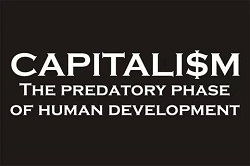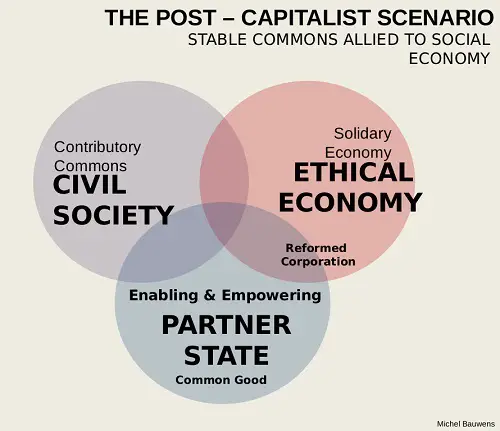TRANSLATE THIS ARTICLE
Integral World: Exploring Theories of Everything
An independent forum for a critical discussion of the integral philosophy of Ken Wilber
 Joe Corbett has been living in Shanghai and Beijing since 2001. He has taught at American and Chinese universities using the AQAL model as an analytical tool in Western Literature, Sociology and Anthropology, Environmental Science, and Communications. He has a BA in Philosophy and Religion as well as an MA in Interdisciplinary Social Science, and did his PhD work on modern and postmodern discourses of self-development, all at public universities in San Francisco and Los Angeles, California. He can be reached at [email protected].
SEE MORE ESSAYS WRITTEN BY JOE CORBETT
Conscious Crapitalism
The Bourgeois Unconscious,
and the Post-Postmodern Self
Joe Corbett
So why is there a commitment by some to the phrase and practice of “conscious capitalism”?
Conscious Capitalism™ has been all the rage among integral and other new age accolades for some time now. Its promise is that capitalism can be redeemed, and the system of profit and consumption that are its foundation can be saved. Although it might sound reasonable, this proposition is really just a way to get an entire civilization to engage in a kind of spiritual by-passing of the fundamental transformation that is needed to redeem and even save humanity from impending doom. In fact, the very phrase “conscious capitalism” is a sort of double-speak code, which makes about as much sense as “conscious murder”, or “conscious feudalism”, or indeed, as if being a corporate Democrat was any better than being a neoliberal Republican.

Lets be clear, Conscious Capitalism is like voluntary recycling, it is a mere gesture toward a more sustainable economic system, and is no solution to the globally systemic crisis of an insatiable drive toward ever increasing profit and consumption. For those who choose to go "conscious" there will be 4 or 5 who will remain predatory and ultimately crush those who go conscious in competition. In other words, unless the "consciousness" is mandated by law and enforced (i.e. regulated in the public interest) there is no hope for a viable conscious capitalism. Moreover, if and when capital does become regulated toward conscious ethics and responsibility, we really aren't talking about capitalism anymore, but rather a social democratic oriented economic system, i.e. socialism.
Of course, there will always be niche markets consisting of conscious, upscale consumers who buy “Green”, but as a systemic proposition, Conscious Capitalism is better conceived of as when capitalists become conscious of their need to transition away from capitalism altogether, as capitalism is, has been, and always will be about the self-interest of individual buyers and sellers rather than the public-interest, or else we simply aren't talking about capitalism anymore. So why is there a commitment by some to the phrase and practice of “conscious capitalism”? The short answer to this question is that conscious capitalism is not so much an idea as it is an identity, and identities are not as easily forsaken as ideas are.

More precisely, the bourgeois unconscious is structured so as to believe, on second-instinct, that individual solutions to collective problems are not only the best but indeed the only solution possible. This is the legacy of the masterful rational autonomous ego, the peculiar structure of the modern self oriented toward efficiency, self-sufficiency, and rational control of the world via quantification and strategic-instrumental calculation. It is the self that has worked to the benefit of humanity for so long now in the West that there is little room for imagination that the self could or needs to be structured and oriented in any other way than rigid control and ascetic discipline, a legacy that is now seen in the triumph of the corporate-military-police-state. More recently the self has been shaped in the postmodern schizoid manner of de-centered fragmentation and meaningless incoherence, a recent legacy that is seen in collective apathy and political corruption. Torn between a one-dimensional materialism and a relativist free-for-all, it's no wonder that many can't tell the difference between individual part and collective whole. That there is no willful collective identity for what needs to be done to truly reconcile human systems with eco-systems is therefore no mystery.
Fortunately, hope is on the horizon, and the form of contemporary spirituality gives us a clue as to where we might look to see the kind of identity and consciousness that can save us (in this sense, a Christ or Buddha consciousness). Briefly, it could be said that the personalization and commodification of new age spirituality is the general form of religion in a decentralized, post-industrial, postmodern, neoliberal, late capitalism. What the relatively recent development of a deinstitutionalized and commodified spirituality shows us is that the changing form of spiritual identity and consciousness follows the specific forms of transformation in the material conditions of existence (being). The different material forms of society and its social relations of production shape different forms of human identity, consciousness and practice.
Now, peer production and the emerging economy of the Commons may (and already do) provide the material conditions of an alternative future spirituality and self. An identity based on networks of cooperation rather than competition, and common property and sharing rather than privatization and commodification, has no need to generate a collective will that puts human systems in balance with eco-systems because that will is already built-in to the foundation of the consciousness and practices of peer production as a collective, commons project. There is no sense of the individual part standing separate from the collective whole or in a dominant relation to others, so there is no gap to mend and heal, there is only an in-built spiritual consciousness and self practice of 'We' and 'I' in nature and society as a unified (yet diverse) integral practice. There is no oppressed and alienated modern or fragmented and aimless postmodern self, but only the post-postmodern self of fellowship and creative communion.
As Michel Bauwens says, “The next Buddha will be collective”.

FURTHER READING
Check out these essays by Michel Bauwens on Integral World (FV):
|
 Joe Corbett has been living in Shanghai and Beijing since 2001. He has taught at American and Chinese universities using the AQAL model as an analytical tool in Western Literature, Sociology and Anthropology, Environmental Science, and Communications. He has a BA in Philosophy and Religion as well as an MA in Interdisciplinary Social Science, and did his PhD work on modern and postmodern discourses of self-development, all at public universities in San Francisco and Los Angeles, California. He can be reached at [email protected].
Joe Corbett has been living in Shanghai and Beijing since 2001. He has taught at American and Chinese universities using the AQAL model as an analytical tool in Western Literature, Sociology and Anthropology, Environmental Science, and Communications. He has a BA in Philosophy and Religion as well as an MA in Interdisciplinary Social Science, and did his PhD work on modern and postmodern discourses of self-development, all at public universities in San Francisco and Los Angeles, California. He can be reached at [email protected].


